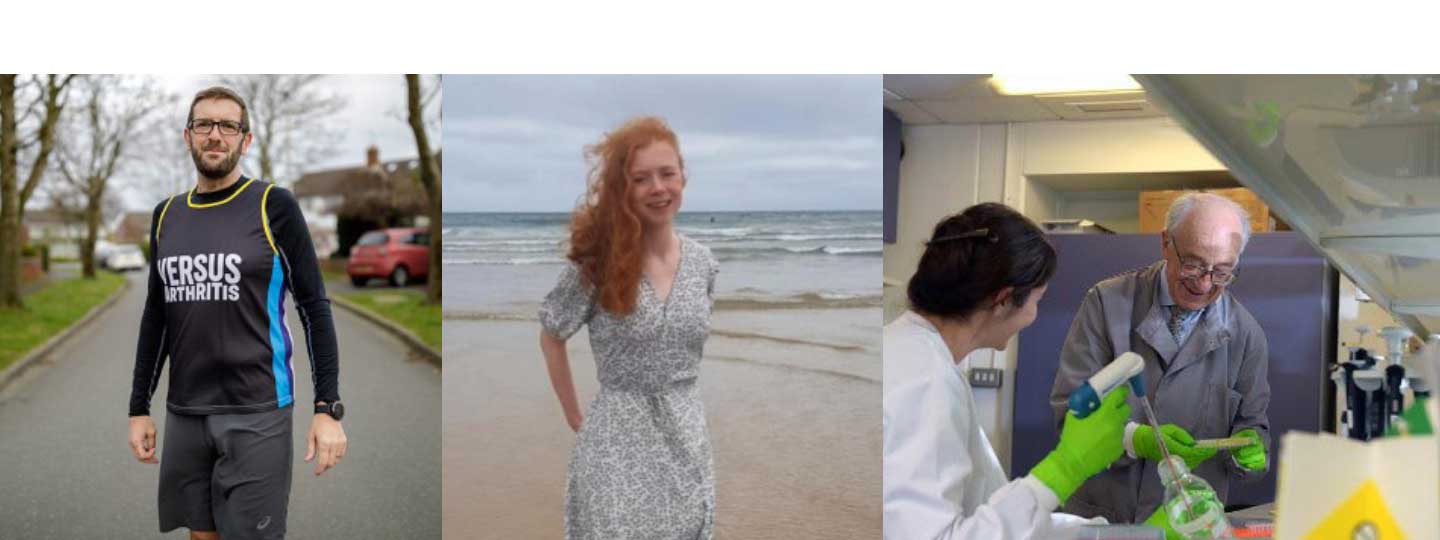Anti-TNF: transforming the treatment of inflammatory arthritis
23 November 2020
The development of treatments such as anti-TNF therapy and newer biologics have made a remarkable difference to the lives of people with inflammatory arthritis. Read more about anti-TNF the inflammatory arthritis treatment revolution.
Types of inflammatory arthritis include:
What is TNF?
Inflammation is a normal process generated by the body to fight against harmful bacteria and viruses.
If you have inflammatory arthritis, this the inflammation process becomes overactive and joints become inflamed (sometimes damaged) and often painful.
Diagnostic tests will show an excessive amount of TNF (a type of protein, also known as cytokine) present in the blood and joints.
How have anti-TNF drugs made a difference?
Before biological therapies, like anti-TNF were available, inflammatory conditions were frequently treated with conventional disease-modifying anti-rheumatic drugs (DMARDs), such as methotrexate and these did not work for everyone.
Unlike painkillers and non-steroidal anti-inflammatory drugs (NSAIDs), DMARDs treat the disease itself rather than just reducing the pain and stiffness caused by the disease.
In the 1980s, we funded key research which led to the development of a new type of DMARD known as biological therapies , specifically, anti-TNF drugs.
The introduction of this new class of drugs has been significant and extremely positive. Studies have shown them to be effective for many people in treating inflammatory arthritis.
Currently these therapies are only given to people who’ve tried other treatments before being eligible for anti-TNF or other biologics.
What types of anti-TNF therapies are available?
There are five types of anti-TNF therapies These include:
Read more about the other types of biologics and how they work to reduce swelling and pain.
Your experiences
Ian and Izzie share how anti-TNF medication has made a difference to their lives. Read their stories in full.
Ian, 52, has psoriatic arthritis.
He said: “I was on methotrexate at first, which helped the psoriasis on my scalp but my joint problems continued, and at Christmas 2014 I was the lowest I’d ever been. As I left work on Christmas Eve I looked back and, in my mind, said goodbye. I couldn’t see any way I could ever go back.”
“Not long after I’d reached breaking point, I was prescribed the anti-TNF drug adalimumab.”
“It was incredible. Within a week I could feel a huge difference and as the days went on, I was feeling better and better. The inflammation in my joints was subsiding.”
Izzie, 23, has JIA and was diagnosed when she was nine.
She said: “Before I started anti-TNF, I was on a combination of anti-inflammatories and methotrexate. Both had heavy side effects, particularly the methotrexate, which made me extremely nauseous and exhausted.”
“Starting anti-TNF aged 11 completely changed my life.”
“It’s so effective against my arthritis that it’s now the only medication I take. It does make me more prone to infections, but I don’t experience any day-to-day side effects. Without anti-TNF medication I think my life would be completely different.”
Our commitment to research and always pushing for answers
Professor David Isenberg is a consultant rheumatologist who’s been working in the field for over 30 years.
He’s witnessed the remarkable difference that anti-TNF drugs and newer biologic drugs have made on the lives of people with arthritis.
“Almost 20 years ago, I was asked to take over the care of a student who had seronegative arthritis affecting his feet, knees, and ankles.
“He couldn’t take methotrexate as it caused liver abnormalities, so for two years I tried him on steroids and other standard treatments, but to no avail.
“The first biologic, infliximab, didn't help, but when Enbrel, the next anti-TNF came along, we decided it was worth trying. The patient came back to see me after six weeks, and as he walked into the clinic I could see he was doing something I’d never seen him do during the two years I’d been treating him… he was smiling and told me, ‘It’s gone; it doesn’t hurt anymore!’.
“I remember feeling a little tingle at the back of my neck when I phoned the lab for his ESR results, a test which measures inflammation in the body.”
“His reading had always been over a hundred (the normal is 20) and they told me it was down to 12. I asked if it was a lab error and they reassured me it wasn’t!
“I felt then that something in my career had truly changed.”
Read how our anti-TNF research is now being used to better understand the impact of COVID-19.
Our investment into future treatments
We currently invest £106.7 million in cutting edge research, of which £67.9 million is dedicated to inflammatory arthritis and immune research, aiming to better understand arthritis as well as develop new drugs, treatments and ways to manage the condition. Ultimately, this research aims to improve the quality of life for people with arthritis.
Find out how you can support our vital services and help people living with arthritis.
Get the support you need
- If you would like to talk to someone, you can call our free helpline on 0800 5200 520 (Monday to Friday, 9am to 8pm)
- Talk to our arthritis virtual assistant, 24/7
- Join our online community
- Stay in touch and follow us on Twitter, Facebook and Instagram.